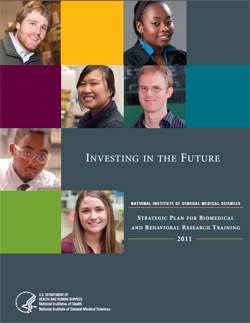UPDATE: The MARC U-Star report includes an addendum on the demographics of the program’s alumni.
We recently analyzed the educational outcomes of trainees who participated in the NIGMS MARC U-STAR program. The goal of the program is to enhance the pool of students from underrepresented groups earning baccalaureate and Ph.D. degrees in biomedical research fields. MARC U-STAR is part of a larger effort at NIGMS to support the development of a highly skilled, creative and diverse biomedical research workforce [PDF]. This study was designed to identify the educational outcomes of over 9,000 MARC U-STAR alumni appointed at 114 institutions between 1986 and 2013.
MARC U-STAR grants are awarded to undergraduate institutions. Each grant supports a continuous 2-year program for the junior and senior (or final two) years of college that provides the trainees with academic enhancement, research training and professional skills development. In addition to these on-campus enhancements, MARC U-STAR institutions are expected to provide each trainee with a summer research experience at a research-intensive institution. The recently released Funding Opportunity Announcement describes the expectation that a majority of MARC U-STAR alumni nationwide will matriculate in a research doctorate program.
Continue reading “Educational Outcomes of the NIGMS Maximizing Access to Research Careers Undergraduate Student Training in Academic Research (MARC U-STAR) Program”

 Many of the themes in our strategic plan for research training have been echoed by the Biomedical Workforce Working Group of the Advisory Committee to the Director, NIH. Among these is the use of individual development plans (IDPs) to facilitate career development discussions and planning between mentees and mentors. I’m delighted to share some progress on this front.
Many of the themes in our strategic plan for research training have been echoed by the Biomedical Workforce Working Group of the Advisory Committee to the Director, NIH. Among these is the use of individual development plans (IDPs) to facilitate career development discussions and planning between mentees and mentors. I’m delighted to share some progress on this front.